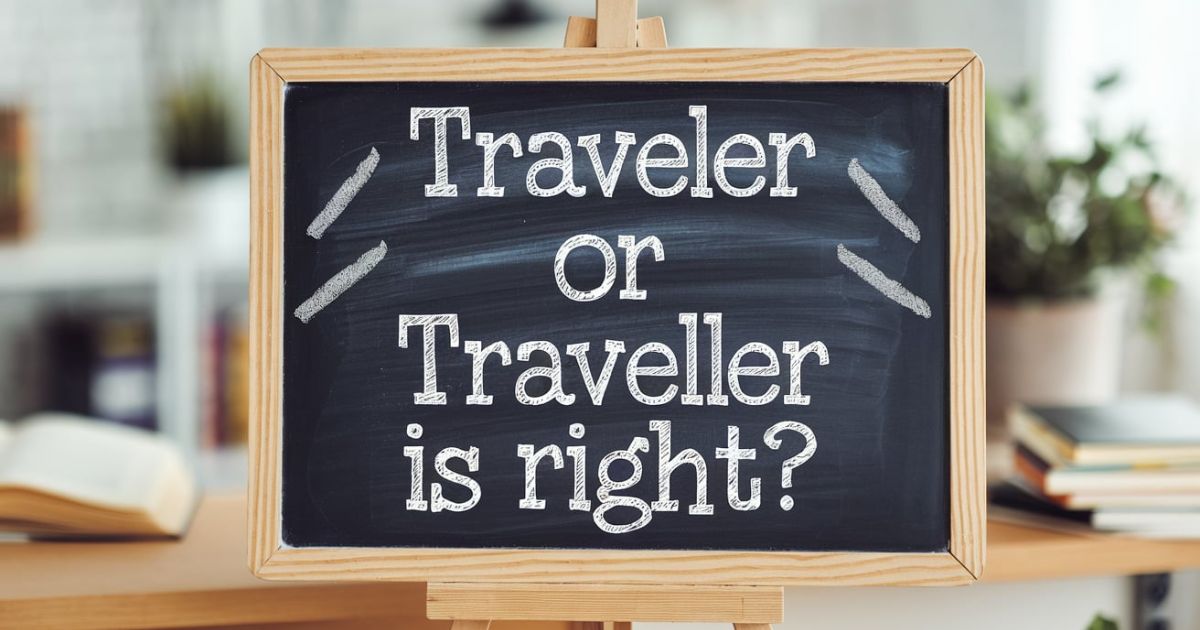If you’ve ever written about journeys, you’ve probably wondered: is it traveler or traveller? The answer depends on where you are and what style of English you’re using.
Both spellings are correct, but they are used in different parts of the world. Let’s explore the spelling differences and when to use each one!
American Way: ‘Traveler’
In the United States, we spell the word as traveler. This follows a pattern in American English where words are often simplified. For example, traveler drops one of the “l”s compared to the British spelling.
This simplified spelling came about in the 1800s, when American writers and publishers tried to make words easier to spell. They believed that using fewer letters made writing clearer and faster.
Think of the word “color” compared to “colour.” The same thing happens with traveler versus traveller. So, if you are writing something for American publications, it’s important to stick with traveler to keep the spelling consistency.
READ MORE: What’s the Plural of Syllabus? Syllabuses or Syllabi?
Example:
Imagine you’re reading a travel blog written by an American. You’ll notice that they use “traveler” in their posts. For instance: “As a traveler in the United States, I enjoyed visiting the Grand Canyon.” The word is spelled with one “l” because that’s how American spelling works.
American Way vs. British Style
| Spelling | Region | Key Features |
| Traveler | United States | Simpler spelling, one ‘l’ |
| Traveller | United Kingdom | Traditional spelling, two ‘l’s |
British Style: ‘Traveller’
On the other hand, in the United Kingdom, the word is spelled traveller with two “l”s. This follows the traditional spelling rules of British English, which often keep spellings that have been used for hundreds of years.
British English tends to preserve older forms of words, even though they may be longer or more complex. People in the UK feel that maintaining the traditional way of spelling helps connect modern English to its roots.
That’s why in British books and British publications, you will see traveller with the double “l.” This is not just true for “traveller,” but for other words like “centre” (British) vs. “center” (American).
Example:
Picture yourself reading a novel set in London. The main character might say, “As a traveller in the United Kingdom, I’ve always wanted to see Big Ben.” The author uses two “l”s because they are following British spelling rules.
Where and How to Use
So, when do you use traveler or traveller? The most important thing is to know your audience and where they are. If you’re writing for an American audience or American publications, stick to traveler with one “l.” If you’re writing for a British audience or British books, use traveller with two “l”s.
This isn’t just about American English vs British English. It’s also about being consistent in your writing. You wouldn’t want to switch between traveler and traveller in the same text, as it might confuse your readers..
Language Changings
Language is always changing, and that’s a big reason why we have different spellings like traveler and traveller. In the past, people spelled words in many different ways, and it wasn’t until dictionaries became common that spelling variations began to settle.
Even today, English keeps evolving, and words like traveler show how changes can make language easier or more efficient.
For example, Americans prefer simplified spelling, while the British hold on to their traditional spelling. Over time, more words might change, and new spelling debates could arise. But right now, traveler and traveller represent a rich history of how English adapts to its speakers.
Example:
Think about how technology changes language. For example, texting has made people use shorter versions of words like “u” instead of “you.” In the future, we might see even more language changes, but for now, knowing whether to use traveler or traveller helps you navigate today’s English spelling variations.
Tips for Traveler or Traveller: Which Spelling is Right?

If you’re unsure which spelling to use, here are some helpful tips:
Know Your Audience: If your readers are mostly from the US, use traveler. If they are from the UK, use traveller. This ensures spelling consistency and makes your writing clear for your readers.
Follow the Style of the Publication: Check the guidelines of the magazine, website, or book publisher you’re writing for. American publications will often require traveler, while British publications will prefer traveller.
Stick to One Version: Even if you’re writing for an international audience, pick one spelling and stick with it throughout the text. Mixing traveler and traveller can make your writing seem unprofessional.
Use Grammar Tools: Online grammar checkers can help you stick to the right spelling. These tools often let you choose whether you want to follow American spelling or British spelling, and they will flag inconsistencies.
Learn More About Language Differences: Understanding American English vs British English helps you avoid confusion with words like “color” vs “colour” or “center” vs “centre.”
ALSO READ: Totalling or Totaling: Which Spelling to Use?
Conclusion
Both Traveler or Traveller are correct, but it depends on where and how you use them. American spelling prefers traveler with one “l,” while British spelling uses traveller with two “l”s. Knowing the spelling variations in American English vs British English helps you write clearly and accurately for different audiences.

Osbert is a skilled linguist and educator specializing in English grammar and vocabulary. With years of experience, he has dedicated his career to helping learners enhance their language skills. Osbert is passionate about simplifying complex grammar concepts and is the founder of EnglishInfoz.com, a platform focused on English language education.
